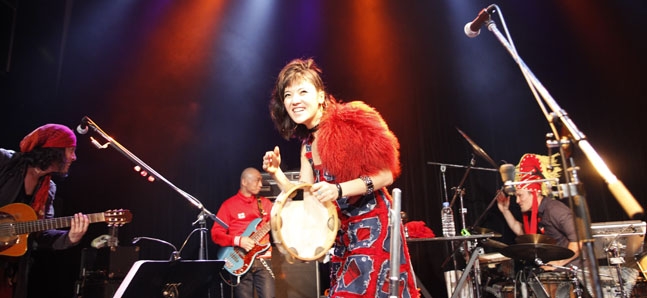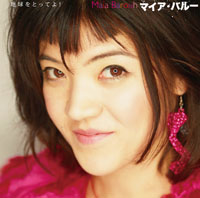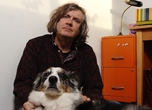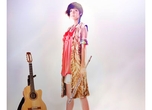Maïa Barouh: interview
A musician influenced by experiences in Paris, Tokyo and across the globe

Posted: Thu Nov 18 2010
In addition to playing several instruments – including the flute and the guitar – Maïa Barouh is also blessed with an incredible singing voice, talents that together with a unique personality, have led her to receive musical acclaim worldwide. Born to French singer-songwriter, actor and producer Pierre Barouh (founder of French music label Saravah) and a Japanese mother, she’s well accustomed to travelling back and forth between Paris and Tokyo – absorbing the musical cultures of both countries along the way.
So, you were born in Tokyo?
MB: Right, in a hospital in Aoyama. I think my folks were living in Kojimachi at the time. Soon after I was born we moved to France, where we lived until I was about 15 or 16.
So you grew up in a multilingual environment, using both French and Japanese?
MB: Right, I spoke both. My parents seem to have put a lot of thought into my education, which is something I’m really grateful to them for. My mother and father both agreed about the importance of learning Japanese from an early age. In Paris, I attended a Japanese school so my schooling was entirely in Japanese; however, outside of school, at home for example, I spoke French. I think the balance between languages was probably just about right.
What kind of music did you listen to as a child?
MB: There was always some kind of live music playing in our house; Pierre’s friends are mostly rugby players or musicians, or actors. It felt like there were always people around the house; always gathering around the dining table for a performance or a rehearsal or something – it was just that kind of place, which probably had a lot to do with the fact that I didn’t start listening to music for myself until the age of about 14 or 15. The first music I remember listening to and consciously thinking ‘this is pretty good’ was something Pierre had produced, by a Brazilian singer called Bia. I’ve an older half-brother who works at Saravah and listens to all kinds of different music. From rock to jazz, when it comes to music he’s pretty clued in. He’s introduced me to all kinds of music – jazz musicians Chet Baker and Bill Evans, for example.
Do you think the environment in which you grew up helped nurture a desire to express yourself?
MB: I think so. However, living in an environment with such an abundance of good music, I didn’t think it necessary for me to try to make any music of my own. In junior high school, I wanted to become a biologist, because I liked insects and animals. Although, having said that, my family took me to live events even before I could crawl; I’m told that, as a toddler, when I was still wobbly on my feet, I’d hold myself up by clinging to the leg of a chair and stare at the stage. At live events, Pierre would invariably put me on stage and tell me to sing – I really hated that. When he came to get me, I’d try and hide myself in the corner somewhere or under a table or something. [Laughs] I guess I was kind of shy. But, after a while, I started to enjoy performing, and before I knew it, I was asking for the microphone. [Laughs] At the age of six, I began practicing classical piano.
When did you decide to become a musician?
MB: I saw a girl playing the flute during a recording in Rio [de Janeiro], in Brazil – Pierre and the others were there for one of Bia’s recordings and they’d taken me with them – and thought, ‘That’s it, that’s what I want to do!’ The flute was the first instrument I decided to play for myself. I was 16 at the time.
The fact that you came into contact with so many different cultures at such a young age must have had a big influence on you …
MB: Absolutely. Plus, instead of being regular holidays, the travels invariably brought us into contact with local people. Pierre had very little interest in travelling as a tourist, instead, whenever he went somewhere, it was always to visit someone he knew personally or to live; each time he went somewhere he always got immersed in that country’s local culture – which is probably why I still can’t simply go on what you’d think of as a regular holiday. Similarly, I’m lucky enough to have travelled to various countries and been exposed to various cultures and ways of thinking – experiences which have definitely had a big influence.
Have you ever thought about how you fit in to it all, about your own ‘identity’?
MB: I think I’ve probably thought about it before, aside from the fact that I’m of mixed parentage, hasn’t everyone? I went to a school in Paris but studied in Japanese, at a school for Japanese children, but when I came back to Japan I felt completely out of place; I was like, ‘I have no idea what these people are thinking, this sucks.’ [laughs] and ‘I’m so Parisian!’ [Laughs] I probably wasn’t the best person to be around – in fact, the people who knew me then still tell me how un-likeable I was at the time. [Laughs] I think my behaviour was probably a result of not understanding and being in denial. However, by forming a band with some Japanese people and getting involved in music, I completely got over my initial anxieties. So, although there was a time when I wasn’t quite sure where I was from, how I fit in or what I should do, things like that have never really been a big issue. I guess you could say that I’m really fortunate to have always had my previous encounters and my love of music to fall back on.
When you first began playing the flute, what kind of music did you play?
MB: Whilst studying classical music in Tokyo, I took a trip to Vancouver to study English for a while and ended up joining a jazz big band. We performed pieces such as Gershwin’s ‘Rhapsody in Blue’ – one of my favourites – and I soon discovered just how incredibly enjoyable playing with others could be. I remember thinking that it doesn’t get any better than this. It was a real high. I was supposed to return to Tokyo to continue my high school education, but I ended up dropping out. Instead, I began studying for university entrance exams, and, at the age of about 17 or 18, had a chance to visit Aoiheya [a live house in Shibuya, run by chanteuse Masako Togawa], where I met a Chin Don band [traditional street band] called Kabocha Shokai. I found their music and outlook fascinating, and, within a short time, became a member of their group.
What was it that you found fascinating?
MB: It’s really hard to explain what it was about their music that I liked – it just kind of struck a chord with me. My foundation was in French music, so I didn’t understand Chin Don music at all – it seemed to have a kind of peculiar, bewitching feel to it, which I really warmed to. In one way it felt sad, and in another way, almost fun – in a weird, kind of ominous way. I like various types of music, including circus music and the waltz, but I think there some kind of special connection between European street music and Japanese Chin Don – there’s something kind of gypsy-like about them.
In 2007 you produced a compilation named ‘Kusamakura’ that involved utasha [a type of traditional folk music from the Amami Islands], tonkori [a plucked string instrument played by the Ainu people of Hokkaido] player Oki [Kano], Kabocha Shokai and Masako Togawa, in what seemed to me like a kind of discovery piece. What led you to produce such unusual music?
MB: Just about everyday there’s some really interesting band playing at Aoiheya, which is where I met most of the bands that appear in the compilation. I’ve had a number of encounters at Aoiheya, both personal and musical. Who’d have thought that Japan was so full of such unique musical talent! From strip to jazz and even heavy metal, Aoiheya host various events; it’s a place that has played a big part in my life. I think it's the kind of place that only exists in Japan – it's the kind of place that French people would really appreciate if they had a chance to see it. As someone who’s half French and half Japanese, I felt it was my duty to produce the album.
You formed your own band at the age of about 22 or 23, right?
MB: Right. At the time, I still didn’t really know what it was I wanted to do exactly, but I had a handful of songs that I wanted to perform and giving shape to my various ideas helped me shed some light on my own world. I envisaged that band having a base of two people. I felt that the Chin Don band I’d been a member of up until then had a few too many members – which in turn occasionally created issues relating how free, or not free, people were to do new things. So I figured I’d see how far we could go by keeping the number of members, and sounds, to a minimum. With that in mind, I paired up with Abu, who played the tuba in Kabocha Shokai, and got started. To begin with we covered songs by artists such as Pierre and Bia; we had some of our own stuff as well, but it wasn't enough to put on a lengthy performance. A part of me quite likes taking risks, so after only a handful of rehearsals we starting touring around doing live performances [laughs] – we played at bars in Golden Gai and even did private Ozashiki performances in 2-tatami-mat sized spaces. [Laughs] More and more doors opened to us and before long we met percussionist Reo [Komazawa]. We were really free to do what we wanted then, there was no set direction that we wanted to go in and the music we were performing was all really varied, which all resulted in a kind of gypsy/tango/Japanese mash – likening our music to food you could say it consisted of something with of a pinch of salt and chilli pepper over here and maybe a dash of Bull-Dog Sauce over there. [Laughs]
When you’re young you want to do just about everything in excess, right? Later, when I was a bit older, I gradually began to choose things more carefully.
So do you still make music in a similar fashion?
MB: Pretty much. We still aren’t captives of one particular genre. Recently, I’ve come to understand that I’m driven to make music with a kind of urban, kind of primitive sound. Although, having said that, it’s not like I’m consciously going out of my way to try make such music; instead, I’m simply trying to create something new – while at the same time bearing in mind where it is that I’m fundamentally coming from. I’d like to create something that people will immediately recognize as something intrinsically my own – although I’m not looking to create anything that’s overly complicated. Someone will occasionally say something along the lines of ‘Maïa’s music is really unique’, but when I listen to my own work, I often hear aspects that I’ve picked up from things I’ve heard elsewhere. So many different things have influenced me, there’s no way I can say that my music is something that I’ve created entirely on my own. Instead, I think of it more as something born as a result of mixing with various people and experiencing various different places and cultures.
You’ve played sessions with a number of different people over the years, what is it about playing sessions with others that you find so interesting?
MB: I think life is a kind of musical session. Sessions motivate me to continue playing – if they suddenly ceased to be then I might just give up, because meeting other musicians is something I find really interesting. I think music can communicate things that words can’t, plus playing with others is often a chance to discover something new about yourself. Playing with a host of different people changes who you are as a person, and can even open up doors that lead to new – and sometimes dangerous – places.
I’ve no idea who I’ll meet in the future, or how any new encounters I have might affect me – but that’s all part of the excitement. I think without the opportunity to play sessions, life might be kind of dull.
Official websitewww.maia-zoku.com/
*Maïa’s debut album, ‘Chikyuu wo totte yo!’ is now on sale. [Buy on amazon.co.jp]
[amazon.co.jpで購入]

Tweets
- About Us |
- Work for Time Out |
- Send us info |
- Advertising |
- Mobile edition |
- Terms & Conditions |
- Privacy policy |
- Contact Us
Copyright © 2014 Time Out Tokyo















Add your comment